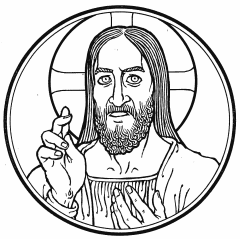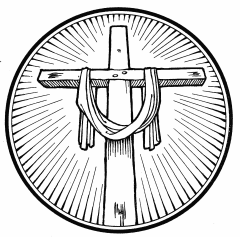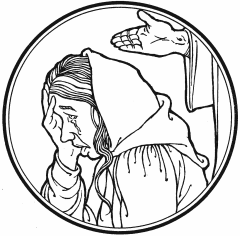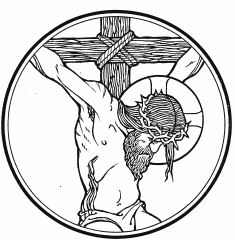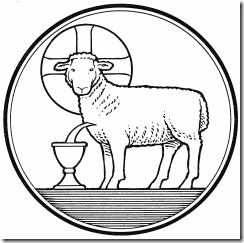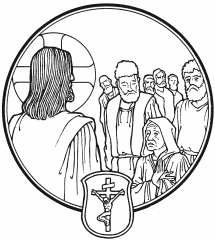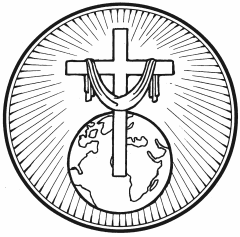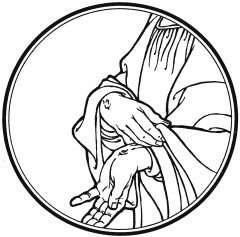 Grace, mercy and peace to you from God our Father, and from our risen Lord and Savior, Jesus Christ, amen. The text for the sermon is the Gospel, which was read earlier.
Grace, mercy and peace to you from God our Father, and from our risen Lord and Savior, Jesus Christ, amen. The text for the sermon is the Gospel, which was read earlier.
If you have ever watched “Little House on the Prairie”, you might remember something about the house. Try to remember very hard about the house. Do you remember the state-of-the-art alarm system and guard dogs that the Ingalls had? Remember all the locks on the door? They didn’t have alarm systems and I never saw guard dogs and to be honest, I don’t ever recall seeing a lock on the door. All they had was a latch to keep the door from flopping in the wind.
Look at the society that we live in today. We have the state-of-the-art alarm systems, guard dogs, deadbolts. We install alarms in our cars, no matter how much the car is worth or not worth. Why do we do all of this? We live in a society with certain fears everyday. Something similar prevailed in Jerusalem on that first Easter evening. This account of Luke is very similar to our Gospel from last week from St. John.
Look at what the disciples had been through. Jesus, their Teacher, had been killed. Judas, one of their own, betrayed Him and all of the others, and then hung himself. They saw what Jesus was put through and saw His death. If the Jews killed Jesus, what would stop them from going after the disciples next? The logical thing for the disciples to do was to hide. They found a room and locked themselves in it. They also had doubts about their eternal salvation. This Man Jesus, who they believed to be the Messiah, was now dead. They followed Him for three years, they were taught by Him, and they taught others about Him. Jesus told them, “I am the way, the truth, and the life. No one comes to the Father except through Me.” Some way, truth, and life He turned out to be. Look at what all of that stuff got Jesus: dead and buried in a tomb.
Imagine the looks on their faces when Jesus appeared to them. Here they are, locked in a room and somehow, Jesus appears to them. Imagine the thoughts of the disciples: “I thought the doors were locked! How’d He get in here?” “What are you talking about? He was dead and buried in a tomb with a huge stone in front of it. How’d He get out?” I’m sure Jesus knew they were scared. He knew what was in their hearts. That is why He greets them with three simple words to help calm them: “Peace to you!” Up until this point, the accounts of Luke and John are very parallel in what has happened. But that changes with the exchange Jesus has with the disciples.
As evening came that first Easter Sunday, the eleven apostles and the other followers of Jesus, men and women, were more and more convinced that the grave was empty because Jesus had risen. But they had little understanding as to just what the meant. People in those days generally believed that the souls of the dead were able to roam the earth. There was a great fear of ghosts. However, it was unthinkable that a dead person could make bodily appearances. Yet that is exactly what Jesus did: with His glorified body, He appears to Mary Magdalene, Peter, the Emmaus disciples, and to the group that has assembled here.
The disciples are understandably frightened, as anyone would be when someone suddenly appears before you in a locked room. Trying to calm them, Jesus asks them a question. “Why are you troubled, and why do doubts arise in your hearts?” Even after they saw everything, they still doubted. Once more Jesus tries to calm them and show that it is He. Obviously with locked doors, there’s no way that anything could get in or out, except Jesus; Jesus could not be locked out. Jesus appeared in front of the disciples in a locked room. There He is, doors locked and all. He even shows them His flesh to help prove that it is He. “See my hands and my feet, that it is I myself. Touch me, and see. For a spirit does not have flesh and bones as you see that I have.” He shows them the holes that are in His body. As we saw in last week’s Gospel, Thomas would not believe unless he could put his fingers in the wounds of Christ. Jesus wants to convince them that they are not seeing a ghost but rather a real, live person. He shows them His wounds, something that only a body and not a ghost could have.
Jesus goes a step further to prove who He is. He asks them, “Have you anything here to eat?” I don’t know a lot about ghosts, but I’m pretty sure that you can see through a ghost. If you gave a ghost something to eat, it wouldn’t have anything for the food to go through so it would just fall on the floor. Jesus is in a tangible form. You can see Him, but not through Him. That means if you gave Him something to eat, He would eat it and it wouldn’t fall to the ground. Jesus is doing all He can to bring peace to the disciples and establish that He is their risen Lord standing before them. Unfortunately, fear was something they couldn’t lock out.
When the disciples gave Jesus the fish to eat, they didn’t know what would happen. Would it fall to the ground? Could a ghost eat fish? Well, Jesus ate the fish. It didn’t fall to the ground. The text says that He took it and ate it before them. So much for being a ghost I guess.
After Jesus showed that He was who He said He was, He talked to the disciples. They knew what had to happen to Jesus. He told them many times during the times that He spoke to them, taught them, ate with them, but they did not understand then. But remember: Jesus’ disciples had the risen Lord Himself standing in front of them, and they still didn’t get it! Jesus had to open their hearts and minds to understand the message of the Gospel. When He opened their minds, they fully understood what had happened to Jesus in the days before this meeting. Christ had to die, He had to suffer, and He had to rise again. If He had not done so, then all of mankind would be condemned sinners doomed to hell. Christ took your sins and my sins upon Himself. Imagine that 2000 years after the death of Christ, you are the one person that Christ died for. If the only two people on this earth were you and Christ, Christ would die for your sins. He would gladly give up His life so that you may have life eternal.
So what does this have to do with you? It means this for you: Jesus Christ died a horrible death so that you can live forever. And to prove His love for you, He gives you His very body and blood in a wonderful meal. Eat His flesh and drink His blood for the forgiveness of your sins and in remembrance of everything He has done for you. Believe this message in the face of doubt. You don’t see the Lord Jesus in front of you like the disciples, and yet at the same time, you do. For wherever His Word is preached and His Sacraments are given out, there is Jesus. Jesus is not in the tomb, for He rose from the dead. But He is right here, right now, in our midst, and He gives you life, and hope, and above all, He gives you peace. Because He has risen from the dead for you, there is no need to hide behind locked doors. In Jesus’ name, amen. Now the peace of God that passes all understanding, keep your hearts and minds through faith in Christ Jesus, amen.
